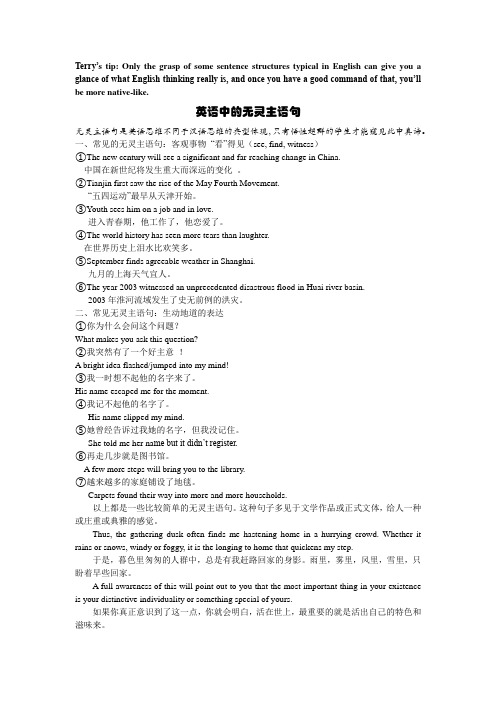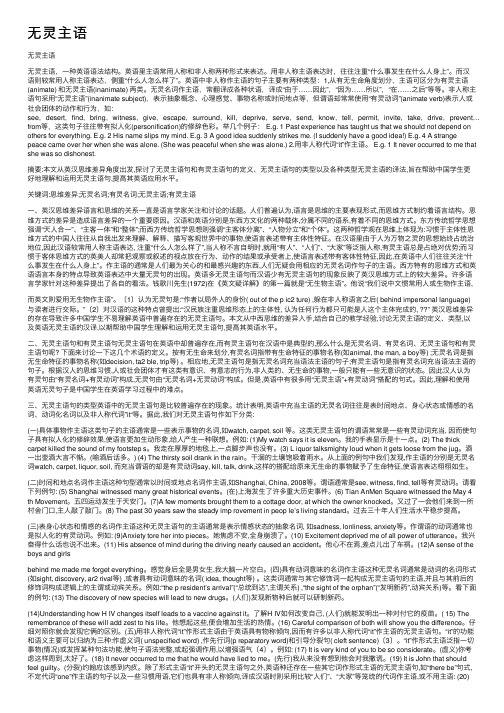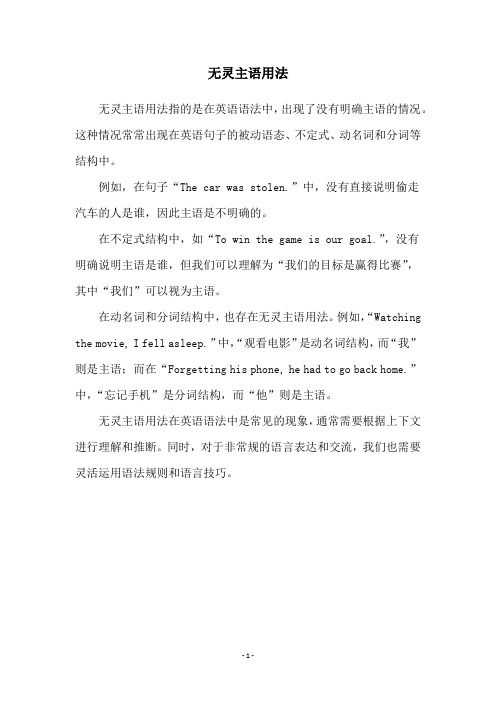无灵主语
无灵主语

无灵主语无灵主语,一种英语语法结构。
英语里主语常用人称和非人称两种形式来表达。
用非人称主语表达时,往往注重“什么事发生在什么人身上”。
而汉语则较常用人称主语表达,侧重“什么人怎么样了”。
英语中非人称作主语的句子主要有两种类型:1,从有无生命角度划分,主语可区分为有灵主语(animate) 和无灵主语(inanimate) 两类。
无灵名词作主语,常翻译成各种状语,译成“由于……因此”,“因为……所以”,“在……之后”等等。
非人称主语句采用“无灵主语”(inanimate subject),表示抽象概念、心理感觉、事物名称或时间地点等,但谓语却常常使用“有灵动词”(animate verb)表示人或社会团体的动作和行为,如:see,desert,find,bring,witness,give,escape,surround,kill,deprive,serve,send,know,tell,permit,invite,take,drive,prevent…from等,这类句子往往带有拟人化(personification)的修辞色彩。
举几个例子: E.g. 1 Past experience has taught us that we should not depend on others for everything. E.g. 2 His name slips my mind. E.g. 3 A good idea suddenly strikes me. (I suddenly have a good idea!) E.g. 4 A strange peace came over her when she was alone.(She was peaceful when she was alone.) 2.用非人称代词“it”作主语。
E.g. 1 It never occurred to me that she was so dishonest.摘要:本文从英汉思维差异角度出发,探讨了无灵主语句和有灵主语句的定义、无灵主语句的类型以及各种类型无灵主语的译法,旨在帮助中国学生更好地理解和运用无灵主语句,提高其英语应用水平。
“无灵主语”与翻译解读

“无灵主语”与翻译
33
Her years sit light on her. 她上了年纪,但不显老。
“无灵主语”与翻译
34
All his efforts were dedicated to the downfall of the enemy and his regaining of power in the party. 他做出种种努力,意在瓦解敌人,并在 党内重新掌权。
“无灵主语”与翻译
35
融合译法
所谓“融合译法”,指的是在翻译含有 “无灵主语”的英语句子时,先结合其 它句子成分进行通盘考虑(当然,有时 也需要结合更大的篇章结构来进行考 虑),再进行汉译。这样一来,英语的 “无灵主语”便被“融化合并”在汉语 的句子当中。
“无灵主语”与翻译
36
Reading supplies him with endless entertainment. 他读书,其乐无穷。 (把英语的Reading和him进行融合, 译为汉语单句“他读书”。)
“无灵主语”与翻译
“无灵主语”及相关概念 根据所指的不同性质来划分,名词可以分为“有灵名 词”( animate noun)和“无灵名词”( inanimate noun)两种类型。在句子当中,“有灵名词”做主语 叫作“有灵主语”(animate subject),“无灵名词” 做主语叫作“无灵主语”( inanimate subject )。 (吴群, 2002)为了讨论问题的方便,我们在此拈出 另外两对概念:“有灵动词”、“无灵动词”、“有 灵谓语”、“无灵谓语”。“有灵动词”作谓语叫作 “有灵谓语”,“无灵动词”作谓语叫作“无灵谓 语”。
“无灵主语”与翻译
29
把英语“无灵主语”译为汉语的句子 在英译汉的过程中,把英语的“无灵主语”进 行扩展,翻译成汉语的一个句子,也是经常遇 到的一种情况。英汉双语比照之下,我们仍会 觉得英语的表达似乎更加简练、生动、形象、 俏皮。
体现英语思维的句型——无灵主语句

Terry’s tip: Only the grasp of some sentence structures typical in English can give you a glance of what English thinking really is, and once you have a good command of that, you’ll be more native-like.英语中的无灵主语句无灵主语句是英语思维不同于汉语思维的典型体现,只有悟性超群的学生才能窥见此中真谛。
一、常见的无灵主语句:客观事物“看”得见(see, find, witness)①The new century will see a significant and far-reaching change in China.中国在新世纪将发生重大而深远的变化。
②Tianjin first saw the rise of the May Fourth Movement.“五四运动”最早从天津开始。
③Youth sees him on a job and in love.进入青春期,他工作了,他恋爱了。
④The world history has seen more tears than laughter.在世界历史上泪水比欢笑多。
⑤September finds agreeable weather in Shanghai.九月的上海天气宜人。
⑥The year 2003 witnessed an unprecedented disastrous flood in Huai river basin.2003年淮河流域发生了史无前例的洪灾。
二、常见无灵主语句:生动地道的表达①你为什么会问这个问题?What makes you ask this question?②我突然有了一个好主意!A bright idea flashed/jumped into my mind!③我一时想不起他的名字来了。
无灵主语句[整理版]
![无灵主语句[整理版]](https://img.taocdn.com/s3/m/4771b952f08583d049649b6648d7c1c708a10bd8.png)
英语无灵主语句一.主语是情感状态的抽象名词谓语选择如:creep, strike, seize, dawn, catch, worm into, grip, enter, register, overcome, take possession of, surround, give way to, desert, pass, tear 等词。
1. Fear gripped the village. 整个村庄笼罩在恐怖之中。
2. Courage deserted him. 他没有了勇气。
3. His presence of mind deserted him. 他失去了沉着。
4. The earthquake struck the village two minutes ago.5. A new dignity crept into his steps. 他走起路来,不知不觉添了几分尊严。
6. Anxiety tore him into pieces. 他焦虑万分,肝肠寸断。
7. By now optimism had given way to doubt. 现在,乐观变成了怀疑。
8. Anger choked my words. 我气的说不出话。
9. Astonishment deprived me of my power of speech. 我惊讶得说不出话来。
10. Neither sorrow nor regret followed my passionate outburst.我这样发作一通之后,既不难过,也不后悔。
11. A chill of horror suddenly swept over him. 他突然感到不寒而栗。
12. Despair seized him at the thought of her setting out alone to renew theweary quest for work.想起她一个人出去重新登上找工作的艰辛路途,他觉得万念俱灰。
无灵主语句

第二类公式:主语(身体部位/音容笑)+有灵动词+sb
(一)常见此类名词 face/eye/heart/fingers/tears/smile/voice/throat (二)常见有灵动词 fill 充满 stream流淌 interrupt打断linger 继续留存 (tears)spring up =well up 后买你不能直接加人或物 +in one’s eyes (tears) flood/sweep/wash over+sb Tears blurred one’s eyes./one’s eyes got misty ./One’s eyes mistied /dimmed with tears泪眼模糊 tears (roll down one’s eyes/cheeks/face)泪水落下 spread across 浮现 pale 苍白 pierce刺痛 (eyes)brim: v.(使)满,盛满 with tears (eyes) twinkle /sparkle(眼睛因高兴而)发亮;发光;闪耀 (face/eyes) brighten/light up /glow “面露喜色,露出饶有兴趣或喜出望外的神情” “因...颤抖“tremble /shiver/shake (with fear,panic,excitement,rage...)
3. Rome witnessed many great historic events. 罗马发生过许多重大历史事件。
4. The stadium has seen many exciting football matches. 在这体育场里举办过很多精彩的足球赛。
5. The town boasts a beautiful lake. 这个镇引以为荣的是有个美丽的湖。
无灵主语——精选推荐

⽆灵主语⽆灵主语⽆灵主语,⼀种英语语法结构。
英语⾥主语常⽤⼈称和⾮⼈称两种形式来表达。
⽤⾮⼈称主语表达时,往往注重“什么事发⽣在什么⼈⾝上”。
⽽汉语则较常⽤⼈称主语表达,侧重“什么⼈怎么样了”。
英语中⾮⼈称作主语的句⼦主要有两种类型:1,从有⽆⽣命⾓度划分,主语可区分为有灵主语(animate) 和⽆灵主语(inanimate) 两类。
⽆灵名词作主语,常翻译成各种状语,译成“由于……因此”,“因为……所以”,“在……之后”等等。
⾮⼈称主语句采⽤“⽆灵主语”(inanimate subject),表⽰抽象概念、⼼理感觉、事物名称或时间地点等,但谓语却常常使⽤“有灵动词”(animate verb)表⽰⼈或社会团体的动作和⾏为,如:see,desert,find,bring,witness,give,escape,surround,kill,deprive,serve,send,know,tell,permit,invite,take,drive,prevent…from等,这类句⼦往往带有拟⼈化(personification)的修辞⾊彩。
举⼏个例⼦: E.g. 1 Past experience has taught us that we should not depend on others for everything. E.g. 2 His name slips my mind. E.g. 3 A good idea suddenly strikes me. (I suddenly have a good idea!) E.g. 4 A strange peace came over her when she was alone. (She was peaceful when she was alone.) 2.⽤⾮⼈称代词“it”作主语。
E.g. 1 It never occurred to me that she was so dishonest.摘要:本⽂从英汉思维差异⾓度出发,探讨了⽆灵主语句和有灵主语句的定义、⽆灵主语句的类型以及各种类型⽆灵主语的译法,旨在帮助中国学⽣更好地理解和运⽤⽆灵主语句,提⾼其英语应⽤⽔平。
汉语无灵主语句的理解及其英译

汉语无灵主语句的理解及其英译
汉语无灵主语句是指没有主干动词做主语的句子,没有明确表示出句子主语时,句子主干和句子其他成分有某种关系才能让句子表达意思,故被称为无灵主语句。
无灵主语句可以分为两类:实语无灵主语句和状语无灵主语句。
实语无灵主语句是指在句子中没有主语出现,但宾语是句子的主干,可以将句子的表达意思联系起来的句子。
例如“冬天,穿棉袄”。
在此句中,穿棉袄是句子的主体,宾语,也是动词穿的宾语,因此可以把“穿棉袄”作为句子的主干,用来表达句子的主语,这样就可以把这句话称为实语无灵主语句。
状语无灵主语句是指在句子中没有主语出现,但是状语是句子的主干,可以将句子的表达意思联系起来的句子。
例如“晴天,一起去游泳”,这句话中,晴天是句子的状语,可以将句子的表达意思联系起来,这样就可以把这句话称为状语无灵主语句。
English Translation:
Chinese non-subjective sentences, are sentences without a main verb subject, when there is no clear indication of the subject in the sentence, the main clause and other components must form a certain relationship in order for the sentence to make sense, and thus, it is known as a non-subjective sentence.。
无灵主语用法

无灵主语用法
无灵主语用法指的是在英语语法中,出现了没有明确主语的情况。
这种情况常常出现在英语句子的被动语态、不定式、动名词和分词等结构中。
例如,在句子“The car was stolen.”中,没有直接说明偷走
汽车的人是谁,因此主语是不明确的。
在不定式结构中,如“To win the game is our goal.”,没有
明确说明主语是谁,但我们可以理解为“我们的目标是赢得比赛”,
其中“我们”可以视为主语。
在动名词和分词结构中,也存在无灵主语用法。
例如,“Watching the movie, I fell asleep.”中,“观看电影”是动名词结构,而“我”则是主语;而在“Forgetting his phone, he had to go back home.”中,“忘记手机”是分词结构,而“他”则是主语。
无灵主语用法在英语语法中是常见的现象,通常需要根据上下文进行理解和推断。
同时,对于非常规的语言表达和交流,我们也需要灵活运用语法规则和语言技巧。
- 1 -。
